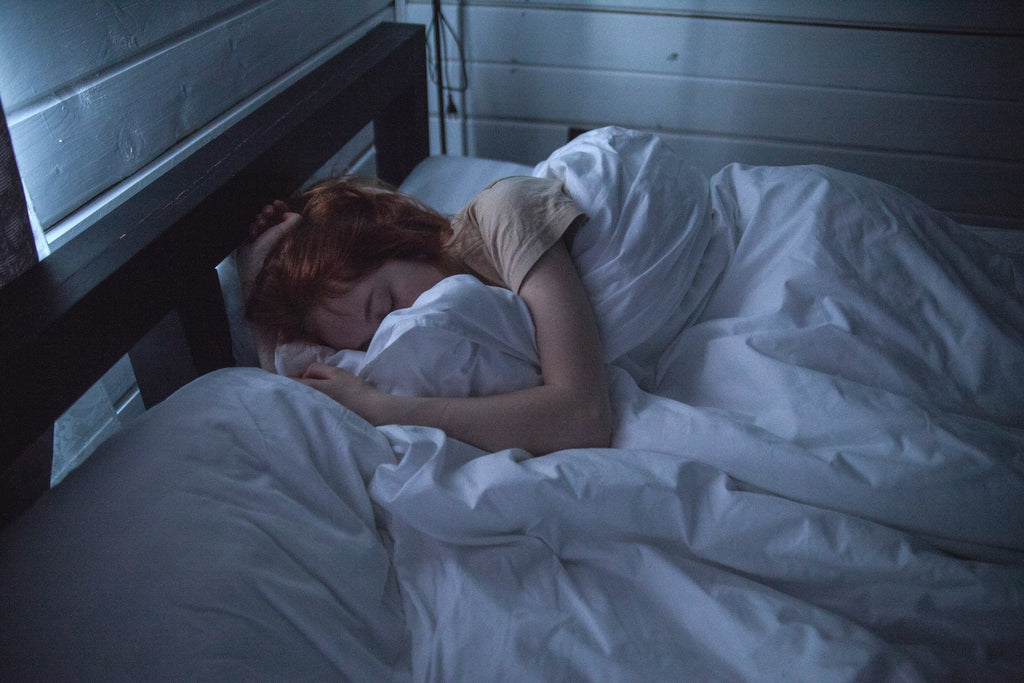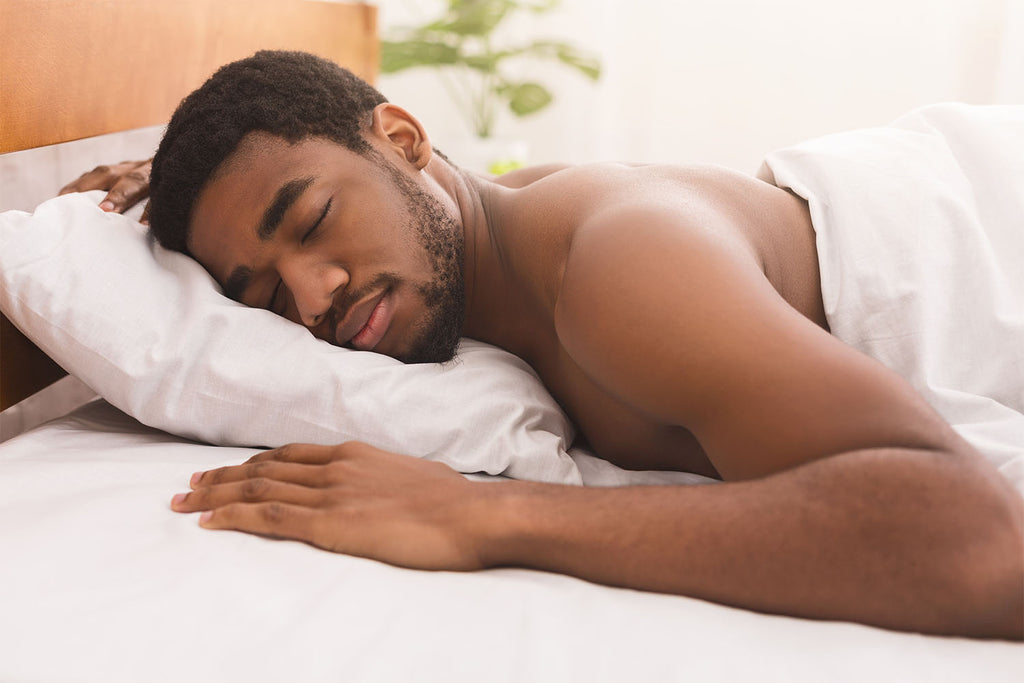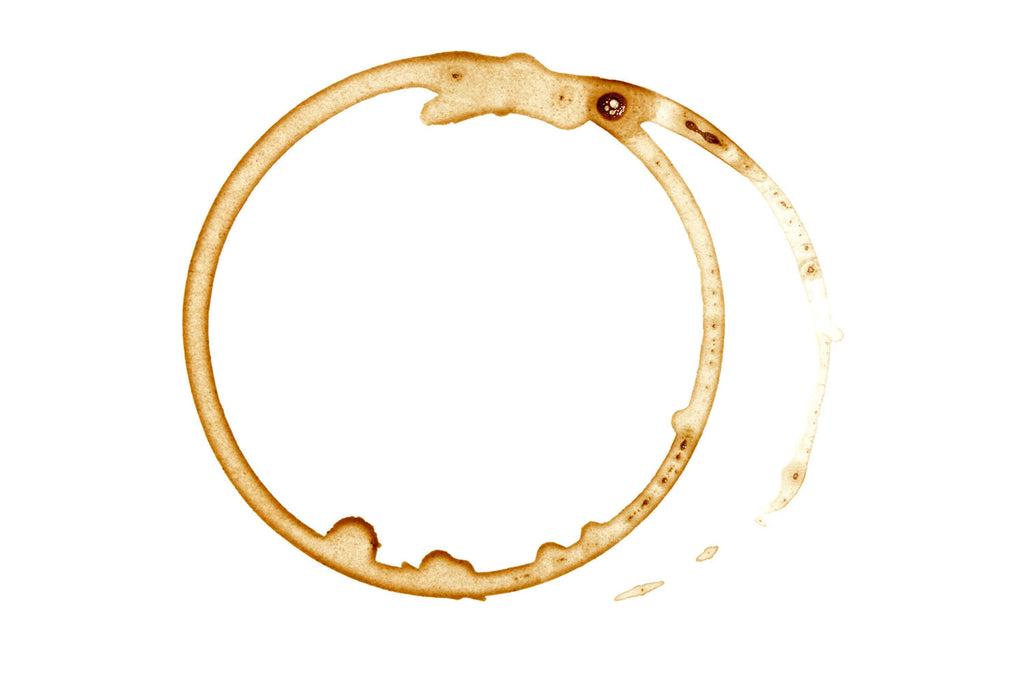
The Link Between Sleep and Mental Health

There’s nothing like a good night of sleep. After a long day, your body desperately craves those Z’s and will do about anything to get them. We all love to sleep, and our sleep loves us.
Sleep is so much more than a way to rest your body every night. In fact, your sleep plays a direct role in maintaining the health of your brain, so it has a direct link to your mental health.
If this doesn’t convince you to make sure to get your eight hours every night, we don’t know what will. So keep reading to find out evidence-based information about how getting more sleep can support your mental health and discover what happens if you don’t get enough of it.
What Exactly Does Sleep Do?
Sleep is so much more than a normal rest. Sure, your body, your muscles, and your organs need a chance to slow down and take a break every day. But there are far more important tasks that sleep accomplishes while your eyes are shut every night.
You may have heard that sleep is broken up into five stages. Well, that’s partially true. But in recent years, scientists have determined that it would be more accurate to describe sleep in four stages; N1, N2, N3, and REM sleep.
Your body and brain go through different things during each stage, and each one is crucial to your daily routines, hormone cycles, and recovery. It’s one of the most critical parts of your routine health care.
Let’s talk about general things you go through when you sleep:
Gives Your Brain a Deep Clean
It might sound strange that your brain needs to be cleaned, but it’s true. The brain works incredibly hard all day long, and that work doesn’t just happen. It creates byproducts and toxins that your body needs to dispose of each and every day.
Luckily, your body does this automatically. While you sleep, cerebrospinal fluid washes over the brain, getting into all the grooves, nooks, and crannies on your brain and cleaning them out. Now, your shiny, freshly bathed brain is ready to face the next day with no hiccups.
Processes and Stores Memory
The importance of sleep when it comes to memory cannot be understated. Your brain processes thousands, even millions, of thoughts and memories throughout the day. So many things happen that are important for you to remember, but your brain can’t just store all of that information in the blink of an eye.
That’s what sleep is for. While you sleep, your brain organizes all of the information of the day: meetings, that new restaurant you checked out, and your child’s soccer game. While you sleep, your brain files all of the good stuff and gets rid of some memories that you might not need.
Balances Hormones
Hormones are an entire world inside your body. They trigger all sorts of functions throughout your body, and they’re pretty finicky. If your hormone levels get off, strange things can start to happen to your brain and your body. This imbalance can lead to the development of mental health disorders and medical conditions.
While you sleep, your body goes through a bit of a reset when it comes to your hormones. Everything slows down; your body evaluates hormone levels and produces more if needed. If you want your hormones appropriately regulated, a good night’s sleep is vital.
Boosts Your Mood
Have you ever woken up from a restful night of sleep feeling relaxed, happy, and motivated? Well, there’s a reason for that. Sleep is fantastic for your mental state. Restorative sleep correlates with improved mood and positive well-being. Better sleep = better you!
What Happens if You Don’t Get Enough Sleep?
As you can see, sleep does a ton for the body, and we haven’t even scratched the surface of all of the body and brain processes that happen during sleep. Since it’s so vital, a lack of sleep has a few pretty unpleasant side effects.
Let’s look at some of the consequences of sleep deprivation.
A Cycle of Stress
A few nights in a row of low sleep quality or lots of sleep disturbances can take a toll on your ability to regulate stress. The prevalence of stress is caused by a hormone called cortisol, and if your body doesn’t go through a healthy sleep state, your cortisol levels can get out of whack, causing more stress and worry.
This is a double-edged sword because, as we all know, it can be tough to get to sleep when you’ve got a lot of stressors swirling around in your mind. This can often cause a vicious cycle. Not enough sleep causes stress; stress causes you to not get enough sleep, etc.
In this way, poor sleep puts you at higher risk of mental health problems or mental illness. Anxiety disorders, bipolar disorder, and other mental health conditions can all be caused, in part, by poor sleep. In addition, if you already deal with a psychiatric condition like ADHD or OCD, too little sleep can exacerbate the symptoms.
Trouble With Memory
A lack of sleep can cause problems with memory. If your brain doesn’t have enough time to properly process all of the information from the day, it can have a hard time accessing that info in the future.
In addition, the brain needs rest to function at maximum capacity. Specifically, poor sleep reduces the activity of the hippocampus, the memory center of the brain. If you have unproductive sleep habits, your memory could suffer in more ways than one. Getting the right amount of sleep is vital for healthy cognition.
Low-quality sleep can also be a risk factor for developing psychiatric disorders like schizophrenia later in life. Don’t get good sleep because it will help you tomorrow. Get restorative sleep because it will support your health years down the road.
Tiredness and Grogginess
We all know the painful tiredness that comes after a fitful night of sleep. Whether it comes from sleep problems like sleep apnea or unhealthy sleep patterns, the effect is still the same: fatigue and weariness.
There’s a reason for this. If you get a terrible night of sleep, it messes with what is called your circadian rhythm. It’s also called your internal clock. It’s basically the alarm clock of your body, alerting the body when it’s time to be awake and when it’s time to be asleep. If the rhythm gets thrown off, you’ll be tired or awake at the wrong times, a vicious cycle of daytime sleepiness.
How To Improve Your Sleep
So we know that sleep is crucial for both mental and physical health, but what do we do about it? The answer, of course, is to get better sleep.
Now, that’s easier said than done, especially if you have a sleep disorder like chronic insomnia, but these tips may help you get a better shut-eye than you’ve had in a while.
It’s All In the Routine
Routine is everything when it comes to sleep. Remember, your body has an internal clock, the circadian rhythm, that tells it when to be asleep and when to be awake. You need to give this clock every chance to be correct.
Go to bed and wake up at around the same time every day, even on weekends. Most people need between seven and nine hours of sleep a night. This may sound tough, but improving sleep difficulties starts with a bit of discipline.
Take an Hour To Wind Down
The hour before bedtime is crucial. Your body can’t go from hustle to slumber at the drop of a hat. It needs time. So an hour before bed, put away your phone for the night, start your nighttime routine, dim the lights, and get your body in the mood for sleep.
If you have difficulty falling asleep, this small thing will go so far toward improving sleep. Think of this as your sleep hygiene. Relaxation techniques can help as well.
Exercise
Many cases of sleep impairment can be helped by getting a bit of exercise each day. It’s not smart for your overall health, but specifically for your sleep health too.
Exercising uses up a lot of the energy in your body. If it’s used up, your body will be more tired when it’s time for bed. It’ll help you fall asleep faster and can even improve your sleep quality. If you deal with issues like restless leg syndrome, exercise can be especially helpful.
Watch Your Food
We know, late night snacks are absolutely heavenly, and it’s great to drink a couple of glasses of wine and crash. But all of these things can lower your sleep quality. If your body is busy digesting food or dealing with alcohol in its system, it’s taking away energy from the functions of sleep we discussed earlier.
That means that even if you have a proper sleep duration, the quality of those seven to nine hours isn’t as good as it should be, which could leave you feeling tired the next day.
Get Comfortable
Discomfort (especially if you’re not getting proper support to your neck and back) can take a toll on your sleep. Ensure that your mattress is comfortable enough for you to sleep on each night.
If you’re not getting the support you need, try getting a mattress or mattress pad that will contour your body, helping cradle and lift your head, neck, and back. This will truly help you stay comfortable and rested throughout the night.
Support Your Health: Sleep Well
Adolescents, young adults, older adults, everybody needs to get quality sleep every night. Health professionals have told us that we need our eight hours a night, but it’s still so easy to ignore it. When we care about our mental well-being, we take steps to get better sleep.
If you try out any of these tips and they work for you, tell us your story in the comments below. We’d love to hear from you! And for more information about sleep and bedding, check out eLuxury.
Sources:
Getting a Good Night's Sleep | National Institute on Aging
How Your Brain Reorganizes Itself While You Sleep | University Hospitals




